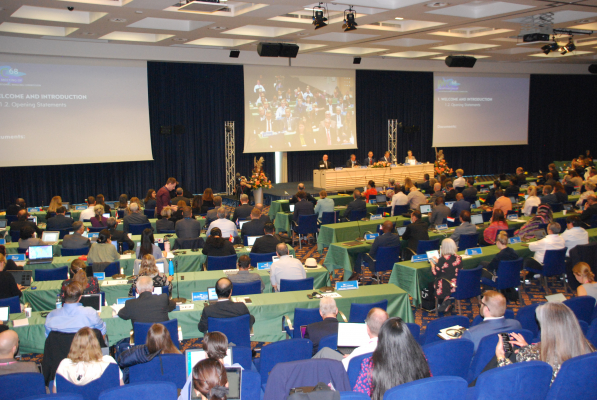The first IWC plenary session in four years began with a welcome from the Slovenian Minister of the Environment and Spatial Planning, Uroš Brežan, the Minister of Foreign Affairs Samuel Žbogar and the Major of Piran, Denio Zadković .
The Government of Slovenia is generously hosting the Commission meeting for the third time. Opening the proceedings, Minister Brežan highlighted the unprecedented crises of biodiversity, climate and pollution affecting the planet, and the need for solutions of a similarly unprecedented scale. He went on to acknowledge the importance of the finance and governance proposals under consideration at the meeting, saying
"We hope this meeting will bring progress on more effective functioning of the IWC, ensuring sustainable financing and directing the organisation's further steps. This will ensure conservation and management of the cetaceans that contribute to solving the crises and challenges we all face."
The five-day plenary is chaired by the Commissioner for Slovenia, Andrej Bibić. The first substantive agenda item is focused on handling the unprecedented impact of Covid-19 on the ability of governments to pay their contributions – and impact of these debts on their voting rights during the meeting. The immense financial pressures created by Covid-19 have led to delays in payment of IWC annual contributions and withdrawal of voting rights, disproportionately impacting developing countries. The Commission agreed today to temporarily reinstate the voting rights for all governments in arrears of 3 or less years due to the pandemic. This decision returned voting rights to seven member countries.
Presentations were delivered by the Scientific and Conservation Committees who succeeded in the daunting task of consolidating four years of work, and for the Scientific Committee four annual meeting reports, into short presentations. Both the challenges and the benefits of virtual meetings were flagged by the Scientific Committee. A remote meeting made progress difficult on some complex and technical issues, but the Scientific Committee also charted a meteoric rise in attendance, with participant numbers rising from 135 at the in-person meeting in 2019 to 450-550 at the virtual meetings in 2021 and 2022. These included a significant proportion of people able to attend for the first time because the meeting was virtual.
Accessibility and transparency were returning themes with new programmes to communicate information on the status of individual whale populations, and to communicate the work of the Scientific Committee more generally. The wide-ranging scientific presentation also covered the comprehensive programme of work to support aboriginal subsistence whaling and support the Commission in meeting its aims to ensure that hunted whale populations are maintained at or returned to healthy levels, and to enable native people to hunt whales at levels that are appropriate to cultural and nutritional requirements in the long term. Many other topics were presented including cetacean disease, strandings, chemical and plastic pollution. Plastic pollution is the subject of a Resolution to be discussed later in the meeting
The Conservation Committee covered similarly broad ground, charting the 118 conservation Resolutions which led to the creation of the Committee in 2003, and looking ahead to the objectives and priority actions of the latest strategic plan. The many programmes highlighted in the presentation included the Bycatch Mitigation Initiative, established in 2016 to assess bycatch, explore potential mitigations and build capacity. The Commission was updated on the progress with pilot projects and collaborative work with a range of organisations including the FAO.
Another important topic included was Conservation Management Plans, with five already established for vulnerable cetacean populations and more candidate plans in preparation. Reports from workshops were also summarised including on climate change and the socio-economic role of whales in ecosystem functioning. Another flagship initiative is the Whale Watching Handbook, a resource to support operators, regulators and the public in making sustainable choices. The Handbook is a living and evolving tool and the Commission was updated on new content.
Governance reform proposals were introduced and discussions on this topic will resume later in the meeting.

